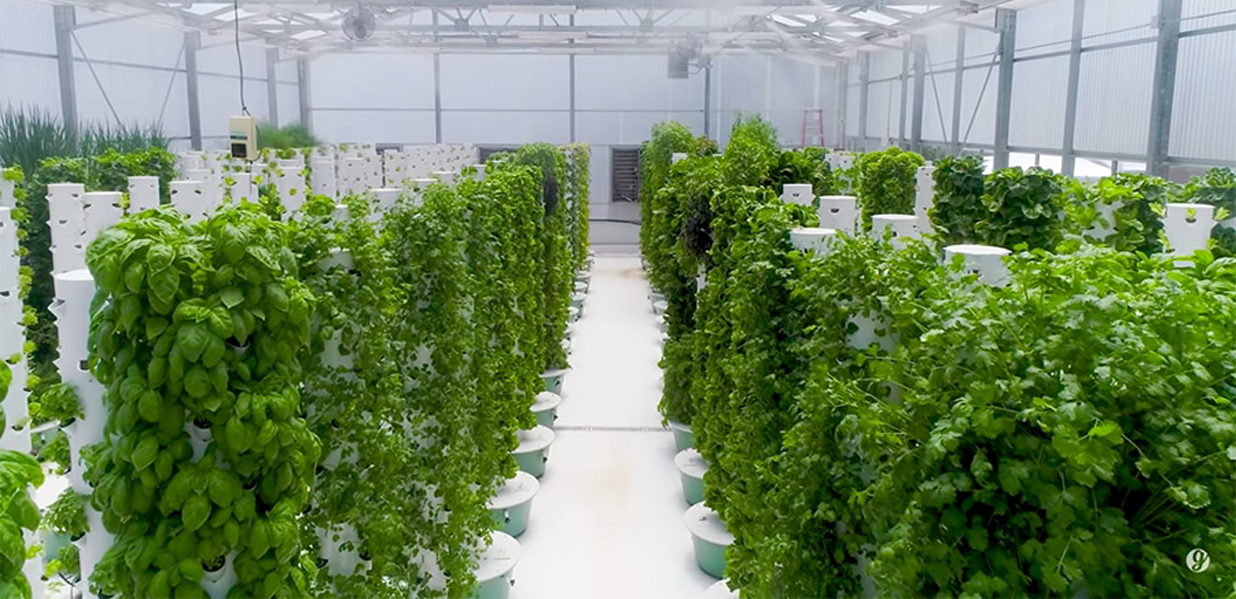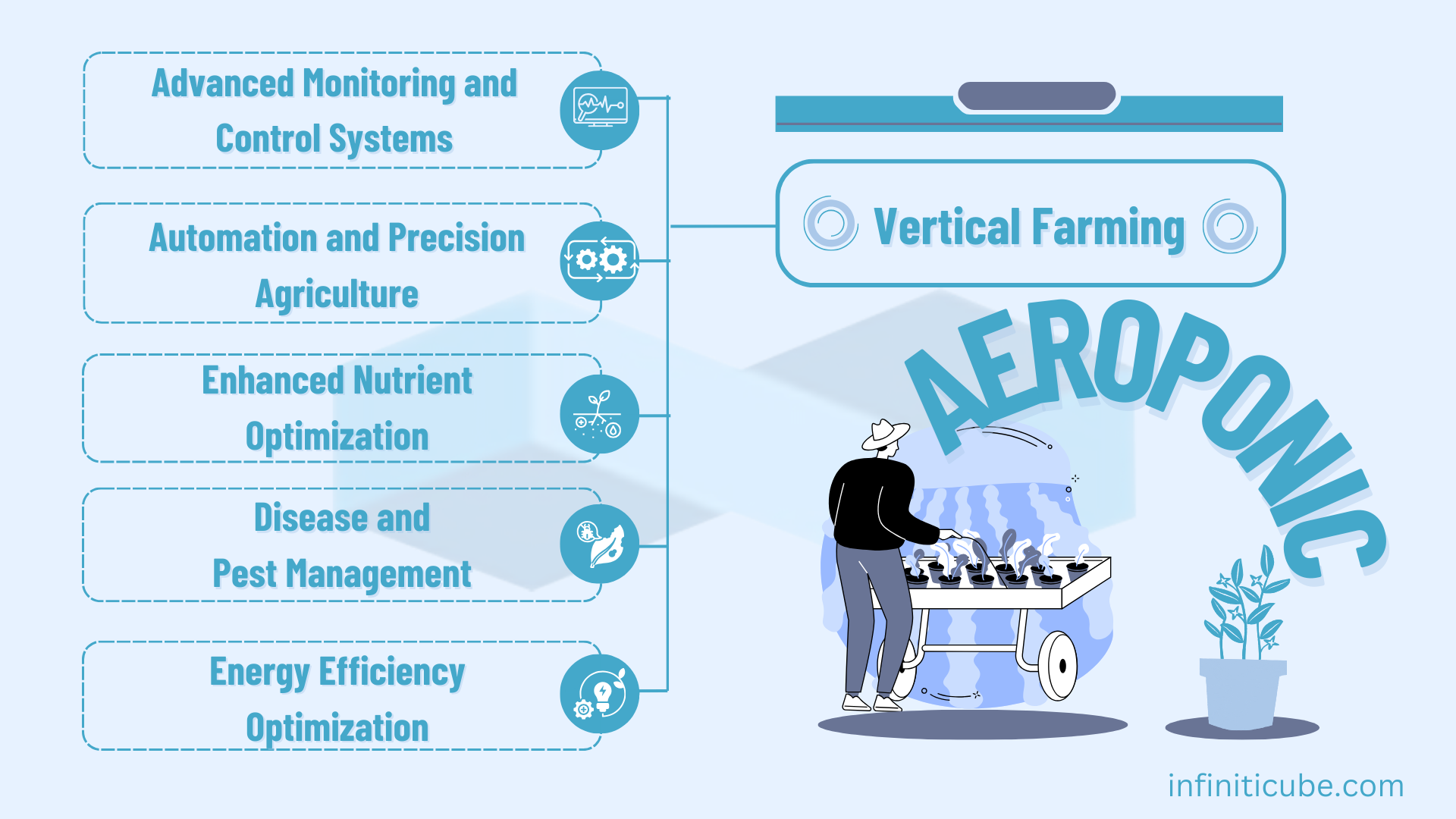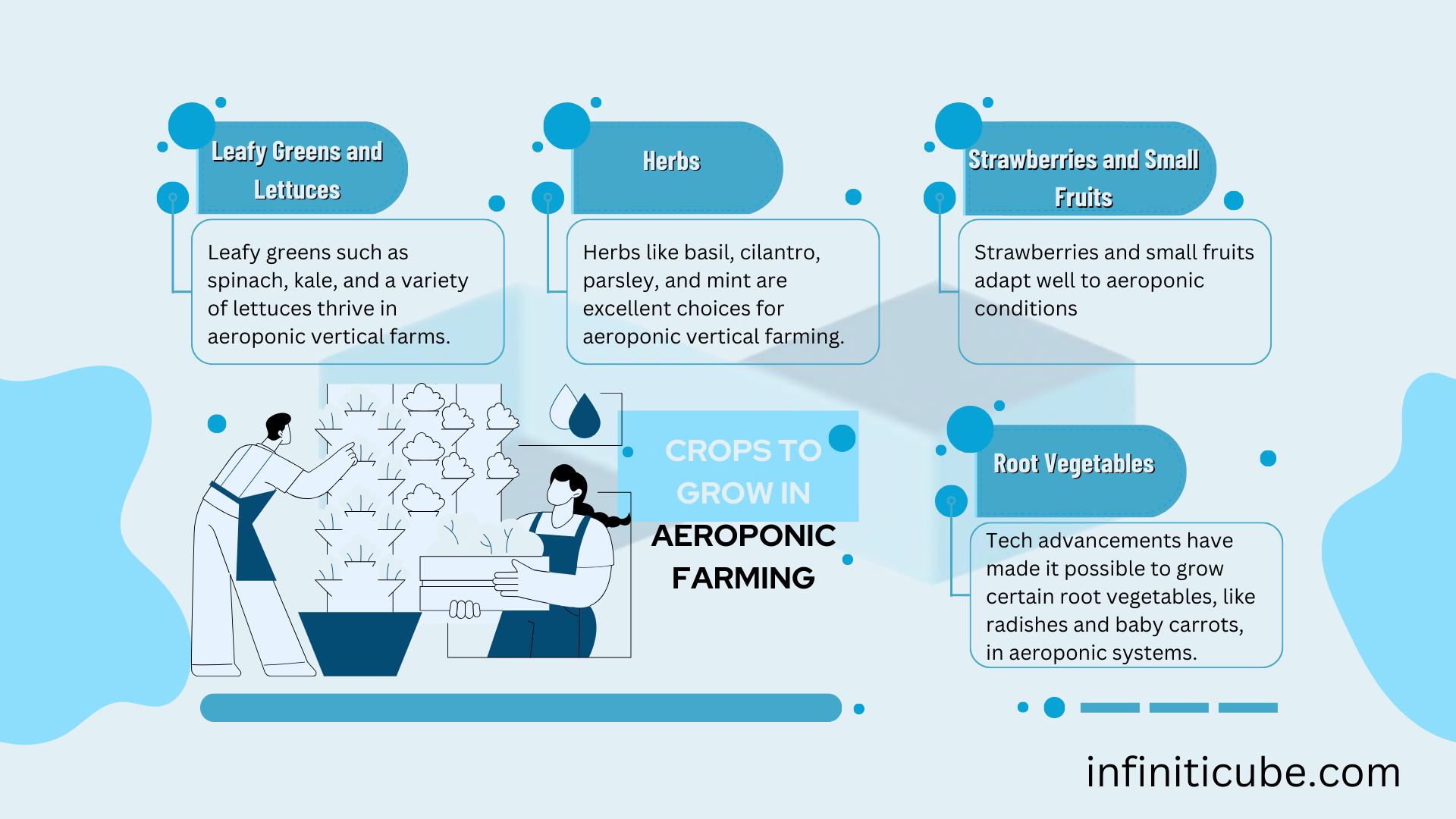


 January 29, 2024
January 29, 2024
 0
0
A new way of farming is changing everything! We're talking about aeroponic farming mixed with vertical farming technology. This blog post is all about this interesting way of growing food that's really different from traditional farming.
We all are witnesses of how farming needs a lot of land and water? Well, not anymore! Aeroponic farming is an innovative method where plants grow in air or mist instead of soil. And guess what? It's making a big splash in the farming world. When you mix it with vertical farming, which is like stacking plants on top of each other, you save a ton of space and resources.
In this blog, we're going to check out everything about aeroponic vertical farming. We'll understand what aeroponic farming is all about and its inception idea. Also, we will see the role technology plays here and the ideal crop you can grow leveraging this unique and innovative farming method.
Whether you love tech stuff, care about the planet, or just want to know what food might look like in the future, come along as we take a look at Aeroponic Farming with Vertical Farming Technology.
Aeroponic farming is a cutting-edge method of growing plants in an air or mist environment without the use of soil. This technique falls under the umbrella of hydroponic systems, which are methods of growing plants using mineral nutrient solutions in a water solvent. Aeroponics stands out due to its unique approach where roots are exposed to air and intermittently sprayed with a nutrient-rich solution.
Aeroponics, a term coined by Dutch biologist Frits Warmolt Went in 1957, revolutionized agriculture. Richard Stoner, pivotal in aeroponic advancements, filed his first patent in 1983. He founded Genesis Technology Incorporated (GTI), inspired by "Star Trek II: The Wrath of Khan," reflecting the film's theme of using technology to solve food scarcity. GTI's innovations, like the Genesis Machine, brought aeroponics to commercial farming, emphasizing water efficiency.
Stoner's work at Colorado State University led to the development of Organic Disease Control (ODC), enhancing plant growth and disease resistance in aeroponic systems. His success caught NASA's attention, leading to a collaboration for space agriculture. Aeroponics became a key solution for long-term space missions, reducing resource needs and supporting onboard food production. The technology also intrigued the EDEN ISS project in Antarctica, aiming to develop sustainable food production for space travel. Aeroponics thus stands at the forefront of agricultural innovation, both on Earth and beyond.
Vertical farming is an innovative approach that involves growing crops in vertically stacked layers, often integrating Controlled Environment Agriculture (CEA) technology. This method maximizes space efficiency and is particularly advantageous in urban areas where arable land is limited.
When combined, aeroponics and vertical farming create a synergistic effect. The vertical structure optimizes space usage, while the aeroponic system ensures efficient nutrient and water delivery to the plants. This combination leads to higher crop yields, faster growth rates, and sustainable farming practices.

Our software solutions play a crucial role in optimizing aeroponic vertical farms. We develop advanced monitoring systems that track plant growth, and controls nutrient levels and environmental conditions. This data is crucial for ensuring optimal growth conditions and identifying areas for improvement.
Through automation, we enable precise control over the nutrient misting schedules and environmental conditions, leading to consistent and high-quality crop yields. Our software integrates seamlessly with IoT devices, providing real-time data and analytics that help farmers make informed decisions.
In aeroponic farming, efficient nutrient delivery is vital. Our technology precisely calibrates the nutrient solutions, tailoring them to the specific needs of each plant species. This customization not only boosts plant health and yield but also minimizes wastage of resources, ensuring that each plant receives exactly what it needs for optimal growth.
Our software incorporates advanced algorithms to detect early signs of disease and pest infestation. By analyzing plant health indicators and environmental conditions, it provides timely alerts. This proactive approach allows for immediate intervention, reducing the reliance on pesticides and maintaining the integrity of the crops, thereby ensuring healthier produce.
Aeroponic systems, especially in vertical farming setups, can be energy-intensive. Our software optimizes energy use by intelligently managing lighting, misting, and climate control systems. This not only lowers operational costs but also enhances the sustainability profile of the farm, making it a more environmentally friendly option in the long run.
One of the most significant advantages of aeroponic vertical farming is the substantial increase in crop yields. The efficient use of space and resources leads to a higher density of crops that can be harvested more frequently.
Aeroponic systems use up to 90% less water than traditional farming methods. Additionally, the closed-loop system minimizes nutrient loss, making it a more sustainable and environmentally friendly approach.
With a controlled environment, aeroponic vertical farms significantly reduce the need for pesticides, leading to cleaner and healthier produce. This aspect is particularly appealing to health-conscious consumers.
Aeroponic vertical farming enables year-round crop production, irrespective of external weather conditions. This consistent production capability ensures a steady supply of fresh produce, reducing seasonal dependencies and market fluctuations.
This farming method opens up new avenues for urban agriculture. By utilizing vertical spaces and requiring minimal soil, aeroponic systems can be implemented in urban settings, bringing food production closer to consumers and reducing transportation emissions.

Leafy greens such as spinach, kale, and a variety of lettuces thrive in aeroponic vertical farms. These plants, with their relatively short root systems and quick harvest cycles, are ideal for the high-humidity environment that aeroponics provides. The controlled conditions ensure consistent quality and year-round production, making them a staple in aeroponic systems.
Herbs like basil, cilantro, parsley, and mint are excellent choices for aeroponic vertical farming. Their high value, coupled with the rapid growth in aeroponic systems, makes them particularly profitable. The precise nutrient and water management in aeroponics enhances the flavor and quality of these herbs.
Strawberries and small fruits adapt well to aeroponic conditions. The vertical structure allows for efficient use of space, and the controlled environment minimizes pest issues, which are common in traditional strawberry farming.
Recent advancements have made it possible to grow certain root vegetables, like radishes and baby carrots, in aeroponic systems. These crops benefit from the nutrient-rich mist and controlled conditions, leading to faster growth and higher yields.
Apart from edible crops, ornamental plants also find a place in aeroponic vertical farming. Plants like petunias and marigolds can be grown for commercial landscaping purposes, leveraging the space-saving and efficient nature of these systems.
In conclusion, aeroponic farming, in synergy with vertical farming technology, stands as a beacon of modern agricultural innovation. This combination not only maximizes crop yields and conserves vital resources but also pioneers a sustainable path for food production in diverse environments, including urban landscapes.
The ability to produce crops year-round and the significant reduction in the need for pesticides mark a substantial leap towards environmentally conscious and health-oriented farming practices. As we embrace these technologies, we are stepping into a future where food security, sustainability, and efficiency are not just ideals but tangible realities.
The integration of advanced technology in this field is not merely an enhancement; it's a revolution that redefines what's possible in agriculture. Aeroponic vertical farming is more than a method; it's a testament to human ingenuity and a commitment to a better, greener world. Let us continue to innovate, grow, and sustainably feed our ever-growing population.
Contact us now to implement technological advancements in your vertical farming. You can schedule a call with our expert to discuss your requirements precisely.
What is aeroponics farming?
Aeroponics farming is a soil-less cultivation method where plants are grown in an air or mist environment.
Is aeroponic farming profitable?
Yes, due to higher yields and lower resource usage, aeroponic farming can be highly profitable.
Is aeroponics better than hydroponics?
Aeroponics often offers greater efficiency in water and nutrient usage compared to hydroponics.
Can aeroponic farming be used for all types of crops?
While highly versatile, aeroponics is best suited for leafy greens and herbs; some crops may not be ideal for this method.
Does aeroponic farming require a lot of technical knowledge?
It requires some technical knowledge, particularly in system setup and management, but is increasingly user-friendly with new technologies.

Hello there! I'm Jayesh Chaubey, a passionate and dedicated content writer at Infiniticube Services, with a flair for crafting compelling stories and engaging articles. Writing has always been my greatest passion, and I consider myself fortunate to be able to turn my passion into a rewarding career.
Our newsletter is finely tuned to your interests, offering insights into AI-powered solutions, blockchain advancements, and more.
Subscribe now to stay informed and at the forefront of industry developments.